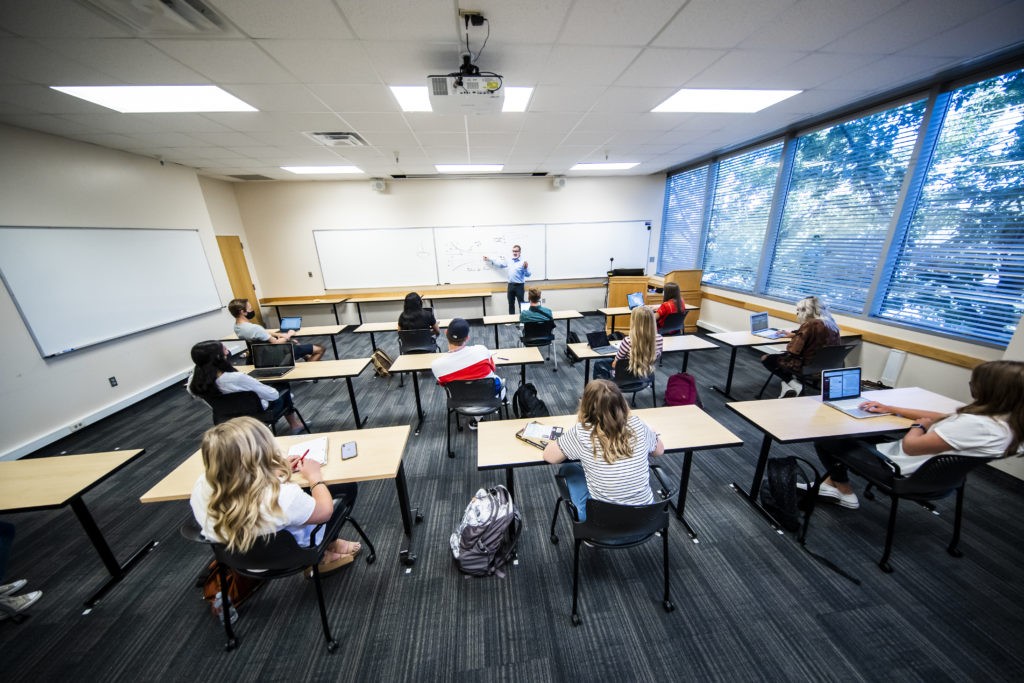
Utah is becoming a hot spot for the delta variant of COVID-19, which has some worried about what this means for BYU’s traditional fall semester.
Recent statistics from the Centers for Disease Control and Prevention show Utah struggling with new cases and hospitalization rates. Approximately 91% of cases in Utah were caused by the delta variant by the first week of July. Nationwide, the variant makes up 83% of sequenced samples.
“COVID is an unpredictable disease, we’ve learned a lot in the last year and a half. If anything, we know this could change and we’ve seen that with the delta variant,” Dr. Michael Baumann said during a press conference with Utah medical leaders on July 7.
Implications on fall semester
The rise of the delta variant is raising concern throughout the nation and some believe it may have an impact on BYU’s planned traditional fall semester.
“The problem is, in Utah the proportion of people who are unvaccinated and refuse to be vaccinated is very high,” BYU biology professor Byron Adams said. “High enough, that we could conceivably have to return to COVID precautions.”
Utah currently ranks 33rd in the nation in percentage of the population fully vaccinated at 44.67% according to Becker’s Hospital Review. This is still a stretch away from the 70% threshold to reach herd immunity according to Johns Hopkins Bloomberg School of Public Health.
BYU is not requiring students to be vaccinated to attend classes on campus this fall semester, but is encouraging students to do so and will implement “vaccine-appreciation rewards” in the fall.
As fall semester approaches, BYU microbiology and molecular biology professor Brad Berges, who had two studies focused on COVID-19 published, recommends people get vaccinated with “some of the safest and most effective vaccines ever produced.”
“The Pfizer and Moderna vaccines are some of the safest and most effective vaccines ever produced, but there are still a lot of people that are afraid to get them,” Berges said.
The potential risks associated with the vaccine are minuscule compared to getting the virus, he said. “The very rare side effects that have been reported are much more mild and rare compared to what somebody could experience with the actual infection itself.”
Adams, who will be teaching on campus in the fall, would prefer an approach where students need to be vaccinated to return to campus.
“Personally, I’d love it if (BYU) requires all students, everybody who is a part of this community to get vaccinated and if someone doesn’t want to get vaccinated, that they’d have a good reason to not get vaccinated, other than ideology; it’d have to be rational,” Adams said.
Adams’ proposal mirrors BYU–Hawaii’s requirement of all students to be vaccinated unless they receive an exemption. “BYU–Hawaii did it right in my opinion, let’s go on board with this,” he said.
Diego Garcia, who will be attending his first full semester of classes, prefers the traditional fall semester BYU has planned, along with caution exercised by students.
“I feel like as of right now, we should do it how it is; everything should be open,” Garcia said.
He added that the campus community should have the memory of the pandemic in the back of their heads and students should continue to take protective measures throughout the semester. If cases do rise to the point of concern, he said he would support a transition back to online classes, despite it being disappointing.
With fall semester around the corner, Garcia is mixed with emotions heading back into the classroom. “I’m really nervous. I feel like I’ve forgotten how to talk to people, almost, but I’m also really excited because I feel like I learn better face to face; I learn better being in contact with people.”




